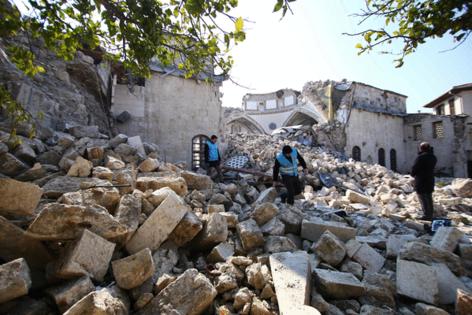Matthew Brooker: Hurricanes and other disasters will help shape our future cities
Published in Op Eds
The future of post-disaster reconstruction may run through an ancient metropolis founded by a general of Alexander the Great. The city of Antakya, known in antiquity as Antioch, was devastated last year in the strongest earthquakes to strike Turkey in more than eight decades. The consortium behind a masterplan to rebuild the city hopes it will become a worldwide model for renewal of urban centers that have suffered the trauma of widespread destruction.
The grim reality is that this is likely to be a growth area in coming years. The wars in Ukraine and the Middle East will necessitate large-scale reconstruction at some stage, with places such as Mariupol and Gaza City in ruins. Meanwhile, Hurricane Milton, which slammed into Florida this month, is a reminder of the economic cost of natural disasters, with damage and losses estimated at up to $100 billion — just two weeks after Hurricane Helene tore through several U.S. states causing more than 200 deaths. Longer term, the climate crisis is raising the risk that more urban environments will be rendered unlivable as rising temperatures intensify the impact of events such as storms and wildfires.
“It’s a huge problem and no one is focused on that,” Furkan Demirci, chairman of the Türkiye Design Council, told me in an interview recently in London, which he was visiting to attend a design forum. Post-disaster cities “looks like a niche subject but it’s not,” he said. “We live in a world of disasters, a world of wars. The climate crisis will eradicate cities. As human civilizations we need to learn again how to rebuild our cities.”
The February 2023 earthquakes destroyed about 80% of the buildings in Antakya, leaving hundreds of thousands of people in the city and surrounding area living in temporary shelters made from shipping container-shaped boxes and in tents. The city is the capital of Hatay province, a stub of southeastern Turkey wedged between the Syrian border and the Mediterranean. This was one of the worst affected areas in the quakes, which killed more than 50,000 people in Turkey. The government put the cost of the damage at more than $100 billion, or about 9% of gross domestic product.
The Türkiye Design Council, a non-governmental organization founded in 2016, assembled an international consortium of more than 30 experts across multiple disciplines to work on the rebuilding project, including U.K. architects Foster + Partners Ltd. and Bjarke Ingels Group, or BIG.
The revitalization vision unveiled by Foster + Partners this summer embodies features designed to strengthen the resilience of the city, including creating green buffer zones around the Asi river and other watercourses to shift buildings away from areas that are more vulnerable to seismic activity. This will have the secondary effect of protecting against flooding, as the green zones provide more opportunity for water to run off. The city has been laid out on an urban block system, with each district having its own high streets, schools, public gardens and courtyards.
Following reconstruction, the city will have three times as many green spaces and twice as many public areas, according to Demirci. At the same time, the average height of structures will fall to five stories from just under six before the quake while providing the same number of housing units. More compact buildings and improved transport networks will provide easier escape routes in the event of future disasters.
It’s clear there are complex tradeoffs between the demands for speed, efficiency and sensitivity to the intangible social dynamics of local communities. That’s even more challenging in a place of historical, cultural and religious significance such as Antakya, which was founded around 300 BC and was one of the largest cities in the Seleucid, Roman and Byzantine empires, as well as a key staging post on the Silk Road trade route linking Europe to Asia.
Getting this wrong would be easy. Demirci showed me a picture of some austere-looking tower blocks, diplomatically declining to name the location (“probably in Turkey as well”). Apartment buildings can be thrown up in a matter of months but the result may be “just a huge dormitory,” devoid of trade or culture and where people are reluctant to live. By contrast, human activity can quickly reassert itself even in devastated communities, with shops springing up amid the rubble and container cities of Hatay.
The planners drew on the experience of previous earthquake reconstruction projects, paying particular attention to Japan, which emphasized garnering the support of local stakeholders in its efforts to revitalize communities following the 2011 disaster. They enlisted local engineers and other experts among almost 1,000 people to work on the redesign, and held public meetings and workshops to build consensus. This transparency had given the Antakya project a high degree of local support, Demirci said.
The design phase, which is now finished, is only the first step. Execution will bring its own challenges for a project that is expected to take 10 years to complete. The pace of Turkey’s earthquake reconstruction hasn’t matched the promises made by President Recep Tayyip Erdogan in the immediate aftermath. Frustration among those still living in container cities after a year a half would be understandable.
The progress of Antakya’s renewal bears watching. However it proceeds, there will be lessons to learn.
_____
This column does not necessarily reflect the opinion of the editorial board or Bloomberg LP and its owners.
Matthew Brooker is a Bloomberg Opinion columnist covering business and infrastructure. Formerly, he was an editor for Bloomberg News and the South China Morning Post.
_____
©2024 Bloomberg L.P. Visit bloomberg.com/opinion. Distributed by Tribune Content Agency, LLC.




























































Comments